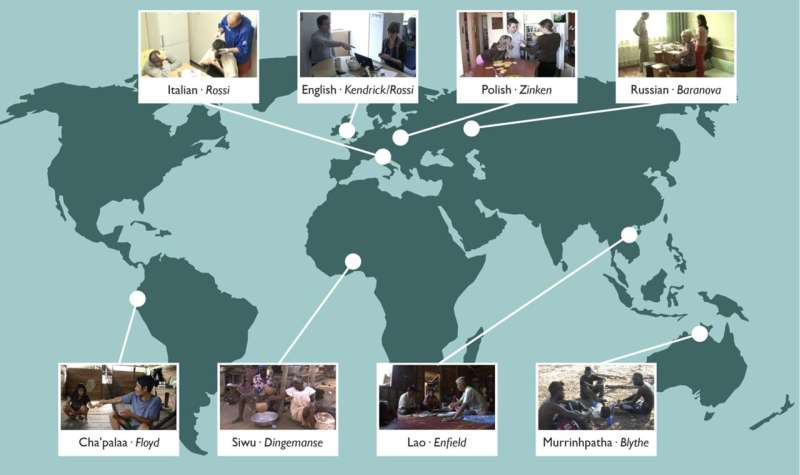This article has been reviewed according to Science X's editorial process and policies. Editors have highlighted the following attributes while ensuring the content's credibility:
fact-checked
peer-reviewed publication
trusted source
proofread
Study shows human tendency to help others is universal

A new study on the human capacity for cooperation suggests that, deep down, people of diverse cultures are more similar than you might expect. The study, published in Scientific Reports, shows that from the towns of England, Italy, Poland, and Russia to the villages of rural Ecuador, Ghana, Laos, and Aboriginal Australia, at the micro scale of our daily interaction, people everywhere tend to help others when needed.
Our reliance on each other for help is constant: The study finds that, in everyday life, someone will signal a need for assistance (e.g., to pass a utensil) once every 2 minutes and 17 seconds on average. Across cultures, these small requests for assistance are complied with seven times more often than they are declined. And on the rare occasions when people do decline, they explain why. This human tendency to help others when needed—and to explain when such help can't be given—transcends other cultural differences.
The findings help solve a puzzle generated by prior anthropological and economic research, which has emphasized differences among people of diverse cultures in how resources are shared. For example, while whale hunters of Lamalera in Indonesia follow distributional norms when sharing out a large catch, Hadza foragers of Tanzania share food more for fear of generating negative gossip; or while wealthier Orma villagers in Kenya are expected to pay for public goods such as road projects, such offers among the Gnau of Papua New Guinea are likely to be rejected as they would create an awkward obligation to reciprocate.
Cultural differences like these present a challenge for our understanding of cooperation and helping in our species: Are our decisions about sharing and helping shaped by the culture we grew up with? Or are humans equally generous and giving by nature? This new global study finds that, while special occasions and high-cost exchange may attract cultural diversity, when we zoom in on the micro-level of social interaction, cultural difference mostly goes away, and our species' tendency to give help when needed becomes universally visible.
Key findings:
- Small requests for assistance (e.g., to pass a utensil) occur on average once every 2 minutes and 17 seconds in everyday life around the world. Small requests are low-cost decisions about sharing items for everyday use or assisting others with tasks around the house or village. Such decisions are many orders more frequent than high-cost decisions such as sharing the spoils of a successful whale hunt or contributing to the construction of a village road, the sort of decisions that have been found to be significantly influenced by culture.
- The frequency of small requests varies by the type of activity people are engaged in. Small requests are most frequent in task-focused activities (e.g., cooking), with an average of one request per 1 minute and 42 seconds, and least frequent in talk-focused activities (conversation for its own sake), with an average of one request per 7 minutes and 42 seconds.
- Small requests for assistance are complied with, on average, seven times more often than they are declined; six times more often than they are ignored; and nearly three times more often than they are either declined or ignored. This preference for compliance is cross-culturally shared and unaffected by whether the interaction is among family or non-family.
- A cross-cultural preference for compliance with small requests is not predicted by prior research on resource-sharing and cooperation, which instead suggest that culture should cause prosocial behavior to vary in appreciable ways due to local norms, values, and adaptations to the natural, technological, and socio-economic environment. These and other factors could in principle make it easier for people to say "No" to small requests, but this is not what we find.
- Interacting among family or non-family does not have an impact on the frequency of small requests, nor on rates of compliance. This is surprising in light of established theories predicting that relatedness between individuals should increase both the frequency and degree of resource-sharing/cooperation.
- People do sometimes reject or ignore small requests, but a lot less frequently than they comply. The average rates of rejection (10%) and ignoring (11%) are much lower than the average rate of compliance (79%).
- Members of some cultures (e.g., Murrinhpatha speakers of northern Australia) ignore small requests more than others, but only up to about one quarter of the time (26%). A relatively higher tolerance for ignoring small requests may be a culturally evolved solution to dealing with "humbug"—pressure to comply with persistent demands for goods and services. Still, Murrinhpatha speakers regularly comply with small requests (64%) and rarely reject them (10%).
- When people provide assistance, this is done without explanation, but when they decline, they normally give an explicit reason (74% of the time). Theses norms of rationalization suggest that while people decline giving help "conditionally," that is, only for reason, they give help "unconditionally," that is, without needing to explain why they are doing it.
- When people decline assistance, they tend to avoid saying "No," often letting the rejection being inferred solely from the reason they provide for not complying. Saying "No" is never found in more than one third of rejections. The majority of rejections (63%) consist instead of simply giving a reason for non-compliance.
More information: Giovanni Rossi et al, Shared cross-cultural principles underlie human prosocial behavior at the smallest scale, Scientific Reports (2023). DOI: 10.1038/s41598-023-30580-5
Journal information: Scientific Reports
Provided by University of Sydney




















